Hitachi Refrigerator Not Cooling (How To Fix)
Why is my hitachi fridge not cooling? Melting ice, rotting groceries, and food spoiling before the expiration date, among others, are telltale signs of a malfunctioning refrigerator.

Of course, a troubling fridge is a dreaded nightmare for every homeowner. Although calling a professional is the first thing that you might want to do, unfortunately, they don’t always turn up right away.
No doubt, Hitachi manufactures top-notch appliances with improved technology and are backed by five or ten years of warranty, depending on the model you go for.
However, it’s not uncommon for them to stop cooling abruptly, no matter how old or new your appliance might be, and sometimes it happens without an error code.
But you need not panic because you can quickly fix the issue without having to call a professional. Today, in this guide, we’ll walk you through some easy ways to fix a malfunctioning Hitachi fridge.
So, let’s dive in!
3 Major Signs That Your Refrigerator Isn’t Cooling
1. The Food Is Spoiling Quickly
One of the telltale signs of a malfunctioning refrigerator is food spoiling faster than it should. So, if you see groceries, packed eatables, or other food items rotting before their expiration dates, the cooling mechanism isn’t functioning properly.
2. Ice Buildup In The Freezer
Does your freezer look like a part of Antarctica because of frost accumulation? Then check the temperature settings, as your fridge might be facing a hard time regulating the temperature.
To defrost the freezer, all you need to do is take out everything from your freezer section and leave the door open. Alternatively, you can defrost it by keeping hot and boiling water in the freezer or blowing a hair dryer.
As soon as the ice melts, turn on the refrigerator and check for ice buildup every few days. In case ice accumulates again after some time, we suggest calling a repairman to diagnose the issue.
3. Humming Sounds
If your refrigerator is making strange humming or hissing sounds, it’s likely that the cooling mechanism isn’t functioning properly.
Other than that, you may notice buzzing, or clicking sounds coming from the refrigerator. Of course, this isn’t normal, and we suggest calling a professional to tackle the issue.
Hitachi Refrigerator Not Cooling – How To Fix
Since a refrigerator is an integral part of any residential establishment, its ceased cooling mechanism intimidates homeowners. However, it’s not a major issue, and almost all refrigerators start acting up after a few years of daily wear and tear.
But don’t worry, for we’ve jotted down some of the things that you can do to troubleshoot a Hitachi refrigerator that has lost its frosty feel.
1. Check The Air Vents
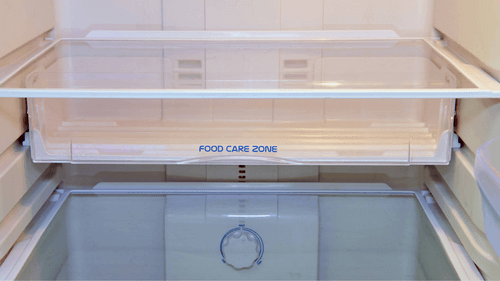
Did you know that blocked air vents can tamper with the cooling capacity of the refrigerator? Hence, the first and foremost thing that you should do is check the air vents to ensure they aren’t blocked.
When air vents are blocked, they prevent the cool air from flowing to the fridge. Consequently, the refrigerator compartment doesn’t receive sufficient cold air needed to keep the food items fresh.
2. Ensure That The Doors Are Closed Properly
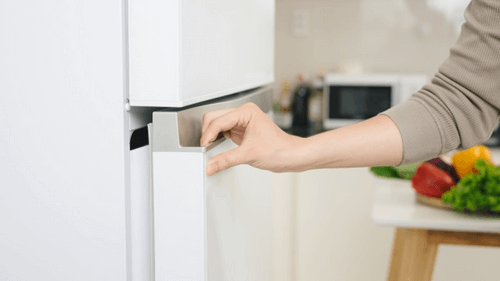
Most of the time, the appliance doesn’t cool adequately because the fridge or the freezer door isn’t closed properly. As a result, overly humid or warm air from the outside enters the compartment and prevents the appliance from cooling.
So, if your refrigerator isn’t cooling properly, check whether the gaskets are functioning or not. Besides, avoid opening the fridge frequently, as this will affect its cooling power and the unit will take longer to cool.
3. Reset The Temperature
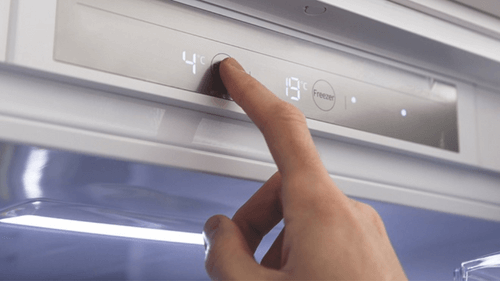
At times, resetting the temperature will restore the frosty feel of the refrigerator. When adjusting the temperature settings, neither set it too high or too low because either of the two will lead to trouble.
As a rule of thumb, set the temperature of both the fridge and the freezer compartment to standard points. However, the temperature setting may vary from model to model, which is why we suggest referring to the instruction manual before making changes.
4. Defrost The Evaporator Coils
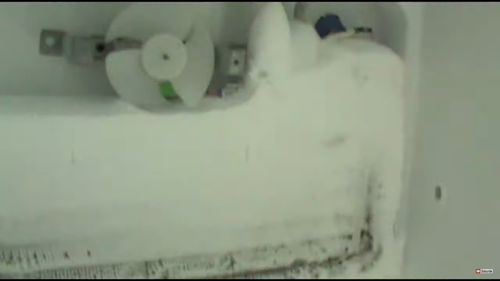
When frost accumulates on top of the evaporator coils, the refrigerator will lose its cooling capacity.
So, if there is an ice buildup over the coils, you’ll have to defrost the refrigerator manually. Another thing that we’d like to bring to your attention is that the frost on the coils indicates that the defrost heater is defective. In such a situation, we suggest calling professionals to repair or replace the heater.
5. Check The Evaporator Fan
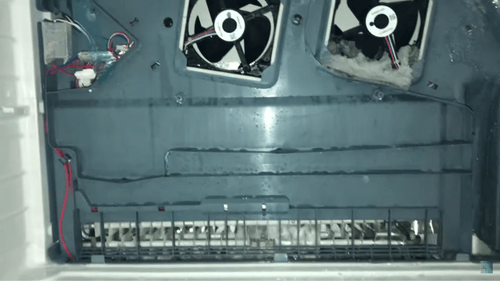
A malfunctioning evaporator fan can also contribute to the poor cooling of the fridge. Whether you have the latest or an old model of Hitachi refrigerator, the evaporator fan will most likely be located at the back of the rear panel of the freezer.
Check the evaporator fan motor by detaching the clip mounting the fan assembly after unfastening the panel, and take off the blades and wiring harness. Next, unfasten the motor from the back of the blades and replace it with a new one. Subsequently, attach the blades, and don’t forget to clip them to secure them in place.
6. Inspect The Condenser Fan
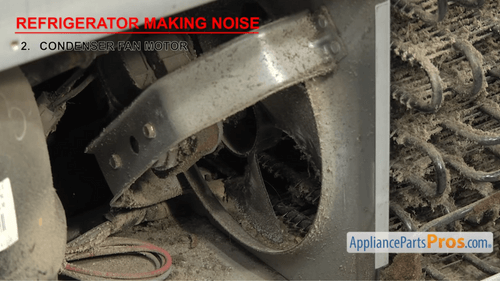
If your food is spoiling and groceries are rotting, check whether the condenser fan is rotating properly or not. Most of the time, the fan is blocked by debris, which is why it’s unable to spin the right way.
Hence, we suggest inspecting the fan for debris, and if you find them, you’ll have to change the motor because it is faulty.
The function of the condenser fan is to keep the appliance cool by preventing the compressor from heating too much.
However, some models of Hitachi refrigerators have coils on the back, which means they are constructed without a fan. And if your model is one of them, we suggest contacting a professional to diagnose the issue.
7. Change The Location Of Your Refrigerator

If none of the components of your refrigerator is faulty, consider changing the location of your refrigerator. Many homeowners keep their refrigerators in the kitchen, which is often the hottest place of a home.
On the other hand, some people keep the refrigerator in a place where the sunlight hits directly, which affects its cooling power. Thus, changing the location of your refrigerator is likely to solve most issues.
3 Ways To Troubleshoot Hitachi Refrigerator Freezer Not Cooling
Is your refrigerator cooling properly, but your freezer isn’t? Then here are three quick ways that will help you resolve this problem.
1. Inspect The Compressor
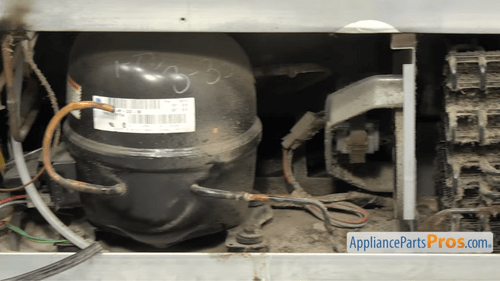
If your ice creams have turned into milkshakes and ice into water, examine the compressor. And if it has become overheated, then it is a strong indication that the condenser fan isn’t working properly. In such cases, replacing it is the best bet, so we suggest contacting Hitachi Customer Care and asking them to send a professional.
2. Check For Leaks In The Freon
Leaking freon can often create cooling issues in the Hitachi refrigerator, which is why we suggest checking it. All you need to do is check whether the coils are evenly frosted or not by detaching the rear panel.
If there is no frost buildup on top of the coils, there is a high possibility that the freon is leaking. Instead of fixing the issue yourself, call for a repairman as he will inspect the issue and repair or replace the component if needed.
However, keep in mind that most modern refrigerators are fashioned without freon, which means the issue may ultimately lie with the compressor.
3. Test The Capacitor And Relay
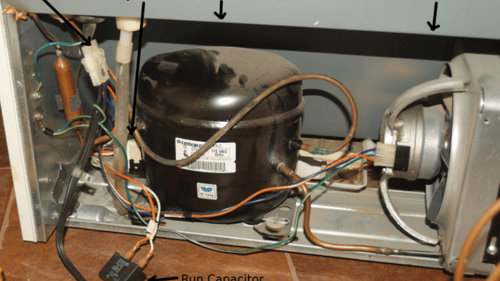
Testing the capacitor and relay may also help you identify the reason behind the poor cooling mechanism of the freezer. Simply grab a multimeter and test the continuity of the three pins of the compressor that link it to the relay. If the continuity of the pin is good, then the relay is defective, which means you’ll have to replace it as soon as possible.
Frequently Asked Questions
Why Is My Hitachi Refrigerator Warm?
The refrigerator usually gets warm when it’s stuffed with too many items, which prevents the cold air from circulating properly. However, if your refrigerator isn’t stuffed, check the components to ensure they are working properly.
How To Identify A Faulty Compressor?
If the compressor overheats or makes strange noises, it’s a strong indication that it is defective and needs to be repaired or replaced.
Summing It Up
With that, we’ve reached the end of our guide today.
One of the best ways to keep your fridge optimally functional for the longest time is to clean it properly and conduct regular checks to ensure that the different components are doing their job. And we’d strongly recommend seeking professional help for the latter.
Likewise, if you find fixing the cooling mechanism too overwhelming, don’t hesitate to call a repairman.
On that note, we’ll bring the curtains down. Till then, stay safe and take care!
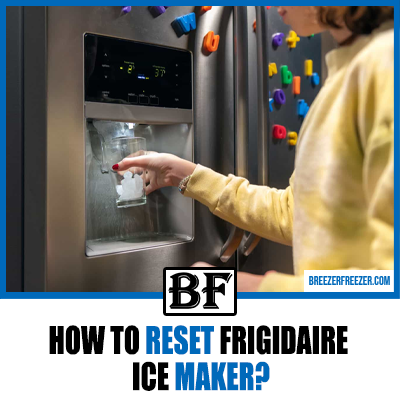
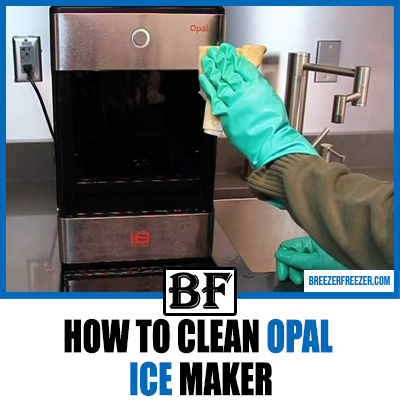
![Is Your GE Refrigerator Making Loud Humming Noise? [Solved!]](https://breezerfreezer.com/wp-content/uploads/2023/11/Is-Your-GE-Refrigerator-Making-Loud-Humming-Noise.png)